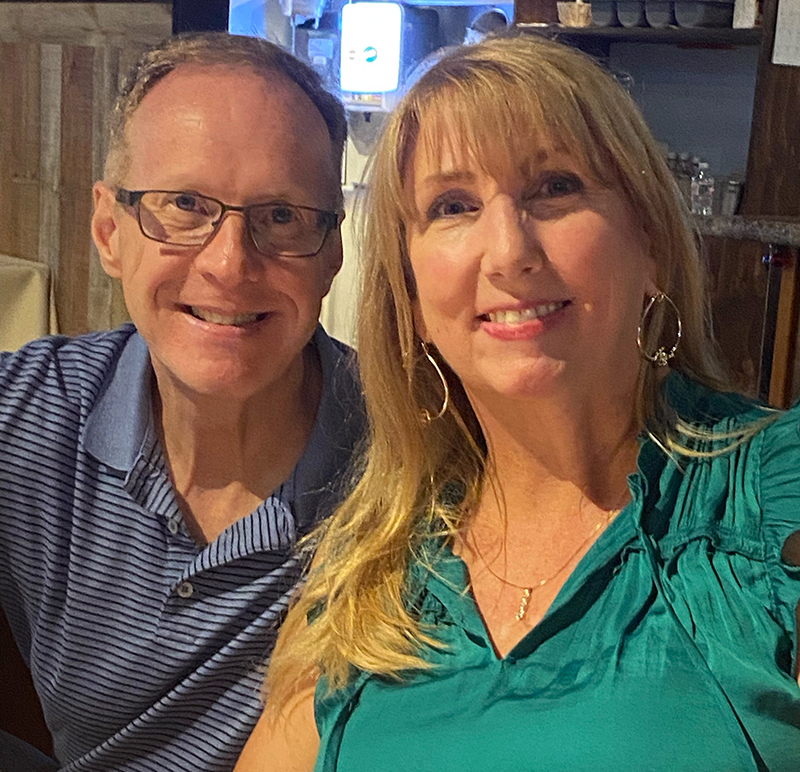Collaboration, Compassion, and Care: Kimberly’s Journey With Merkel Cell Carcinoma
November 18, 2025
As a nurse and lactation consult, Kimberly is no stranger to medicine. For years, she’s helped families welcome new life into the world, guiding them through moments of joy and vulnerability. But in 2021, she found herself on the other side of the patient experience.
It started with a small bump on her arm. “I showed it to my primary care physician, and he sent me to a surgeon to do a biopsy,” Kimberly says. When the biopsy came back, she received a diagnosis that would change everything: Merkel cell carcinoma, a rare and aggressive form of skin cancer that doesn’t typically respond to traditional chemotherapy.
As someone who dedicated her life to caring for others, facing a serious diagnosis of her own was both surreal and overwhelming. “I thought, ‘Wow, am I really experiencing this? Is this real?’” she recalls. “I'm a nurse, and I had never heard of Merkel cell carcinoma. It was a very scary thing to read all the information about Merkel cell, how it can be fatal, that it's very aggressive, and that it often recurs.”
Yet, as Kimberly would soon discover, the same collaboration and compassion she had always given to her patients would come full circle — this time, from a team of doctors determined to find her best possible path forward.
A Rare Diagnosis and a Network of Expertise
Merkel cell carcinoma, or MCC, is a rare and aggressive type of skin cancer known for spreading quickly. Unlike more common forms of skin cancer, MCC often gains resistance to chemotherapy, which can lead to recurrence.
Because Kimberly had never heard of Merkel cell carcinoma, she did what many patients do — head to the internet. “My husband and my initial reactions were, ‘Let’s get online,’” she says. “This was before I saw an oncologist, and, of course, we did a Google search and that was a very, very scary thing.”
Once she was able to see an oncologist at Ochsner Health, she started to understand what was in store for her, like surgery and 6 weeks of daily radiation therapy. And even though her cancer had not spread, it was considered stage 2 because of the size of the tumor.
According to her care team, she would benefit from more extensive care. “They said that it was probably a good idea to join a clinical trial, and they were going to look around for me to see what was available,” she says.
Through a tumor board — a collaborative meeting where doctors from different specialties and institutions discuss complex cases — her care team connected her with a doctor at LSU Health System, Dr. Brian Boulmay, and a promising clinical trial using Keytruda (pembrolizumab), a form of immunotherapy designed to treat advanced cancers like Merkel cell carcinoma. Through this collaboration, Kimberly’s care team offered her an opportunity she might not have otherwise had to fight this aggressive form of cancer.
The Power of Research and Clinical Trials
Kimberly’s referral for the clinical trial was a lifeline rooted in research — one that would change te course of her treatment and life.
Through clinical trials, Keytruda has shown remarkable results in treating Merkel cell carcinoma. Unlike chemotherapy, which attacks cancer cells directly, immunotherapy works by helping the body’s own immune system recognize and fight cancer.
While clinical trials test new treatments or new approaches to treatment, immunotherapy treatment itself is not new. However, the approach used in Kimberly’s clinical trial was.
As Kimberly explains, “My particular immunotherapy had already been tested on many other types of cancers. I felt good about it going into it, even though it was a little scary.”
Kimberly weighed the benefits and risks of participating in a clinical trial. “I knew that there could be side effects. But those side effects that I experienced were nothing compared to if this cancer returned and spread to other parts of my body,” she says.
And fortunately for Kimberly, the clinical trial would take place close to home in Louisiana. “I was so grateful that it was local,” she recalls.
Her decision to move forward was grounded in both courage and trust — plus the possibility of a brighter outcome. Ultimately, her choice to participate in the trial proved to be the right one, offering lifesaving results.
“Since the Keytruda was completed in October 2022, I’ve been cancer free,” she says.
Collaboration in Cancer Care
Kimberly’s story is a testament to her personal strength. “It's very empowering to know that you can get through something like this. There are resources available. There are all the medical advances,” she says. “Whatever's coming next, I'm going to be able to get through it.”
But it’s also proof of what’s possible when doctors and healthcare institutions work together. In Kimberly’s case, the doctors who sat together to discuss her care didn’t see boundaries. They saw an opportunity.
That spirit of teamwork is at the heart of how LSU Health and LSU LCMC Health Cancer Center approach care. By bringing together specialists, researchers, and physicians, we can ensure that every patient’s treatment plan reflects the very best knowledge available anywhere.
Today, Kimberly reflects on her journey with deep gratitude. “I’m grateful to God for carrying me through my cancer journey and beyond. I’m so grateful to my husband, family, Dr. Boulmay, all my doctors, and my care team. And I’m very grateful for clinical trials, cancer research, and for being able to receive care in my hometown through LSU and LSU LCMC Health Cancer Center.”
